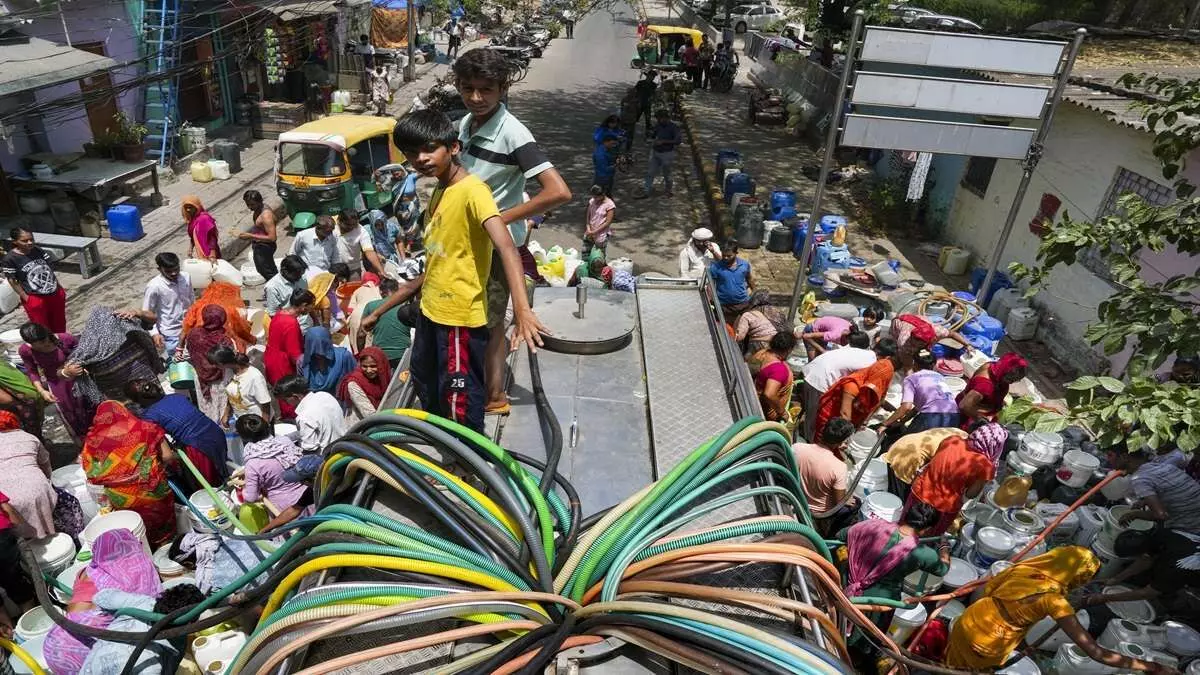Woeful scenario

Delhi, India's bustling capital, is no stranger to water crises. With its burgeoning population and growing demands, the city continues to face a chronic shortage of water, and the problem is only exacerbated by political tensions, infrastructural decay, and environmental challenges. On June 16, Delhi’s minister Atishi implored the central government to intervene, urging the Bharatiya Janata Party (BJP) to negotiate with its Haryana counterpart to secure more water for the national capital. In this plea lies a rightful assertion that the Central government is duty-bound to extend a helping hand to the national capital in this time of crisis. Furthermore, in a letter to Delhi Police Commissioner, Atishi highlighted incidents of suspected foul play, where large bolts were found cut, causing significant water leaks. This sabotage, according to her, resulted in the loss of 20 million gallons per day (MGD) and a subsequent 25 per cent water shortage in South Delhi. The minister didn’t shy away from indicating a deeper political conspiracy, alleging that BJP workers might be behind the pipe cuts. The BJP, on the contrary, has protested against the water shortages, accusing the Aam Aadmi Party (AAP) government of mismanagement. In a show of frustration with the water supply situation, BJP workers held a 'Matka Phod' protest in Najafgarh. These political theatrics, however, do little to address the root causes of Delhi's water woes. In fact, the mutual mudslinging is only eclipsing the broader issues in public forums.
It must be noted that Delhi's water crisis is not merely a result of political negligence but also stems from deep-rooted structural and environmental challenges. The city primarily relies on external sources for its freshwater supply, including rivers and canals from neighbouring states like Haryana and Uttar Pradesh. Needless to say, this reliance is increasingly unsustainable due to growing demand and limited resources. The Delhi Jal Board (DJB) supplies water to over 20 million residents through an extensive but aging network of pipelines. An estimated 58 per cent of Delhi's water supply is classified as non-revenue water (NRW), largely due to leakages and theft, far exceeding global standards. At the same time, groundwater plays a crucial role in Delhi's water supply, yet the city's groundwater levels are rapidly declining due to over-extraction and pollution. The pollution in Yamuna river, which happens to be a key source of water, is heavily polluted and mostly unusable.
The Master Plan of Delhi (MPD) 2041 acknowledges these challenges and emphasises the need for sustainable water management practices. In the long run, rainwater harvesting appears to be a logical strategy in addressing the water crisis. By capturing and storing rainwater, Delhi can reduce its reliance on external sources and mitigate the effects of water shortages. Additionally, improving wastewater treatment processes can enhance the availability of reusable water for non-potable purposes, thus conserving freshwater supplies. Furthermore, the city administration must toil hard to tackle the dominance of ‘tanker mafia’ who, by diverting water meant for legitimate distribution through illicit supply, create a dark zone of inequitable access and corruption. Stringent law enforcement in this regard is the need of the hour. Most importantly, addressing infrastructure leakages is critical. Upgrading Delhi's water infrastructure, ensuring regular maintenance, and deploying advanced leak detection technologies can significantly reduce water losses. These measures, coupled with efficient water resource management, can enhance the city's overall water supply and distribution efficiency in the future.
Delhi's water crisis is a multifaceted challenge that requires immediate attention and coordinated efforts from all stakeholders. Political bickering and blame games only serve to distract from the pressing need for sustainable solutions. By focusing on infrastructure improvement, efficient resource management, and innovative water conservation practices, Delhi can certainly navigate its way out of this crisis.



